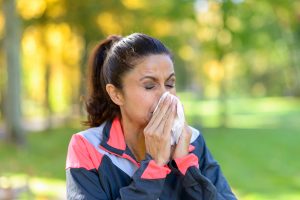 Exercise is part of building a healthy immune system. It can also help temporarily relieve symptoms associated with illness.
Exercise is part of building a healthy immune system. It can also help temporarily relieve symptoms associated with illness.
Knowing that, it seems like exercise during illness is a no-brainer. But it’s not that simple. So, if you’re feeling sick, should you exercise?
Advertisement
The best answer is that it depends. Given the COVID-19 pandemic, there are even more factors to consider.
Generally speaking, if you’re experiencing common cold symptoms like a light headache or slightly runny nose, you’d be okay to exercise outdoors or at least in your home (you wouldn’t want to be passing it around at the community center or studio, however).
COVID-19 has changed that slightly. The reality is that asymptomatic carriers and those with light symptoms can still spread the virus. So, if you do head outside for a jog or walk, be sure to mask up and maintain distance. Scaling back your pace to walk is also a good idea.
If worse symptoms appear, or you’re diagnosed with COVID-19, observe stay-at-home orders. That’s ten days for residents of the United States and 14 days for Canadians.
Even if you don’t have COVID-19 but are experiencing symptoms like fever, chest congestion, or an upset stomach, it’s best to avoid exercise and save your energy for your immune system.
Advertisement
A suitable immune response requires plenty of energy. It’s best to rest up and budget your energy accordingly. At most, head outdoors for a slow walk near home and remain adequately distant from others. Stay home if COVID-19 is suspected.
If you’re not feeling well, even if it’s just something minor, avoid intense exercise. Although it’s ideal to take a day off until you’re feeling better, going out for a light walk to get the blood moving is really about all you want to do.
It’s easy to want to get out there and do more, especially since exercise will usually cause runny noses or slight headaches to subside when taking place. Just remember that what you need are rest and recovery.
